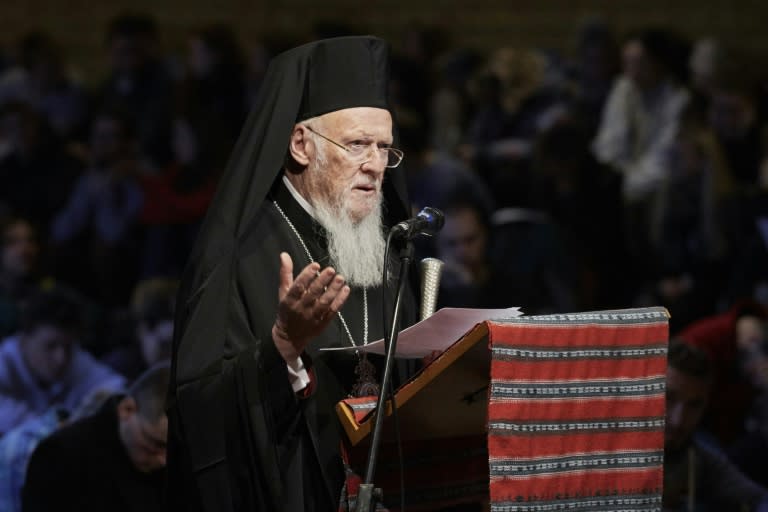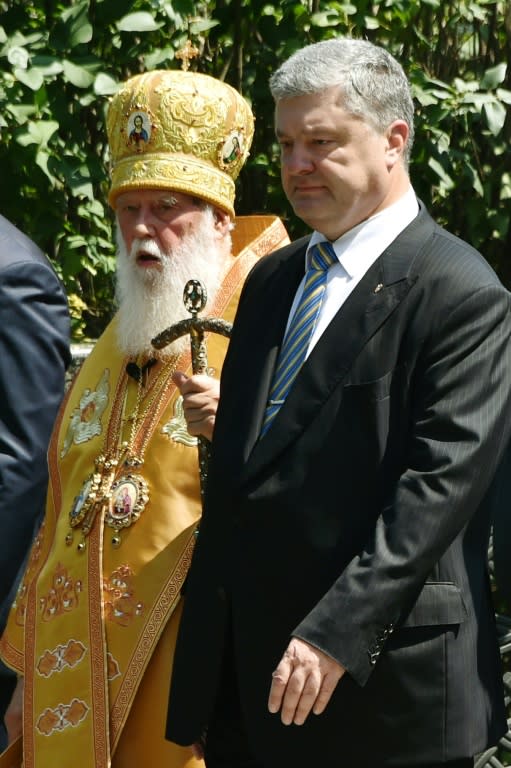Orthodox bishops await historic decision on Ukraine church
Bishops in Moscow and Kiev are awaiting a looming decision on whether Ukraine will get an independent church, ending Russian religious rule in the country and sending shockwaves through the eastern Orthodox world. Istanbul-based Patriarch Bartholomew of Constantinople, known as "the first among equals" of Orthodox Christian leaders, is expected to rule in the coming months on a Ukrainian appeal to cut spiritual ties with Moscow. The decision comes against the backdrop of an ongoing, four-year conflict between Kiev and Russian-backed rebels in eastern Ukraine that made many Ukrainians turn away from the Moscow church. Bartholomew's rival, Russia's Patriarch Kirill, has called the prospect of the Ukrainian church being separated from Moscow an "all-Orthodox catastrophe." He is travelling to Turkey for a summit on Friday in a bid to stop this from happening. The Orthodox church in Ukraine is split between a branch whose clerics pledge loyalty to Moscow and one that is overseen by the unrecognised Kiev-based Patriarch Filaret. While Constantinople is the oldest Orthodox Church, Moscow is currently the most powerful with the largest number of worshippers. It is unclear what granting Ukraine the right to create an independent church will mean in practice. Russian church expert Andrei Desnitsky said "nobody knows" how many churches Moscow will lose as a result. But experts agree that, whatever shape such a decision would take, it would be a blow to Russia's spiritual authority in the Orthodox world. - 'Sanctifying Putin's hybrid war' - Ukrainian lawmakers in April joined the Kiev-based church's appeal to Patriarch Bartholomew to take the country back under his spiritual wing. They stressed Kiev's medieval links to Constantinople, saying that Christianity came to Kiev from the city now known as Istanbul in the 10th century before it was transferred to the Moscow patriarchy in 1686. Both church and government officials in Ukraine claim Patriarch Bartholomew has already made a decision to recognise the Kiev patriarchy but has yet to make this public. A source in the Ukrainian government told AFP that Kiev is "on the finish line" of creating an independent church and that "all sides are preparing for this". But he added that Ukraine is anticipating "difficulties" to arise from the summit this week between the two patriarchs. President Petro Poroshenko has also recently stepped up his rhetoric against the Moscow-loyal branch of Ukraine's church. At a military parade in Kiev on Ukrainian independence day last week, Poroshenko said the Moscow-loyal church "sanctifies (Russian President Vladimir) Putin's hybrid war against Ukraine". He accused it of "praying day and night for Russian might and the Russian army." - 'Trump-Putin' of church summits - Ukraine's Moscow-loyal church criticised the parliament's appeal to Constantinople as government interference in church affairs. "We do not want the church to be used in a geopolitical battle," said Father Mykolay Danylevych, a spokesman for the Ukrainian Orthodox Church of the Moscow Patriarchy. He insisted that his branch of the church is not "subordinate" to Moscow and merely has "links" to it. Russian religion scholar Roman Lunkin said Patriarch Kirill has played an "extremely cautious" role in Moscow's Ukrainian church after 2014 so as not to incite more anti-Russian sentiment. The Russian Orthodox Church, Lunkin said, never sends aid directly to the Moscow-backed separatist authorities in eastern Ukraine and left churches in Russian-annexed Crimea under the jurisdiction of its Kiev branch. While it enjoys more freedom from Moscow, Danylevych said his church expects its leader Patriarch Kirill to improve relations with Constantinople and settle the Ukraine question. "For the church, this meeting is a bit like Putin's summit with Trump," referring to the historic July meeting of the Russian and US presidents in Helsinki. - Tense relations - Lunkin called relations between Kirill and Bartholomew "tense". A key point, he said, was when Patriarch Kirill snubbed a 2016 summit of Orthodox leaders -- the first in over 1,000 years -- in Crete, likely because Ukraine was due to be discussed. Moscow still has not forgiven Constantinople for taking control of part of the Estonian Orthodox Church after the fall of the Soviet Union, Lunkin said. It also resents Constantinople for having links with Ukrainian diaspora churches in Canada and the United States that pledge loyalty to Kiev. Lunkin called the Ukraine issue a "personal" crisis for Patriarch Kirill. Expert Desnitsky did not exclude the Russian Orthodox church appealing to the Kremlin to "use its influence" on Turkish President Recep Erdogan to pressure Patriarch Bartholomew. The Constantinople patriarch relies on the Turkish state for his security. In an interview to Russian state media last month, top church official Metropolitan Illarion said separating Ukrainian churches from Moscow would be "similar to the great schism of 1054," referring to the separation of what are now the Catholic and eastern Orthodox churches. "For the Russian church," expert Desnitsky said, "this is a kind of religious Maidan", referring to central Kiev square where in 2014 clashes between riot police culminated in the ouster of Ukraine's pro-Russian president Viktor Yanukovich.




